Report on HR Skills, Development, and Performance at Unilever
VerifiedAdded on 2022/12/01
|18
|5984
|404
Report
AI Summary
This report delves into the crucial role of Human Resources (HR) in organizational success, focusing on the multinational consumer goods company, Unilever. It examines the essential professional skills, behaviors, and knowledge required of HR professionals to drive sustainable business performance. The report analyzes a personal skills audit and develops a professional development plan, contrasting individual and organizational learning and development approaches. It explores the impact of high-performance working on employee engagement and competitive advantage, and evaluates different performance management strategies. The report emphasizes the importance of HR in fostering a competitive economy, highlighting how effective HR practices contribute to achieving both organizational and individual goals. The content covers topics such as communication, leadership, critical thinking and adapting to changing technology. The report further analyzes personal SWOT analysis and the development of skills for the HR manager. This report provides a comprehensive overview of the critical aspects of HR management within a leading global organization.
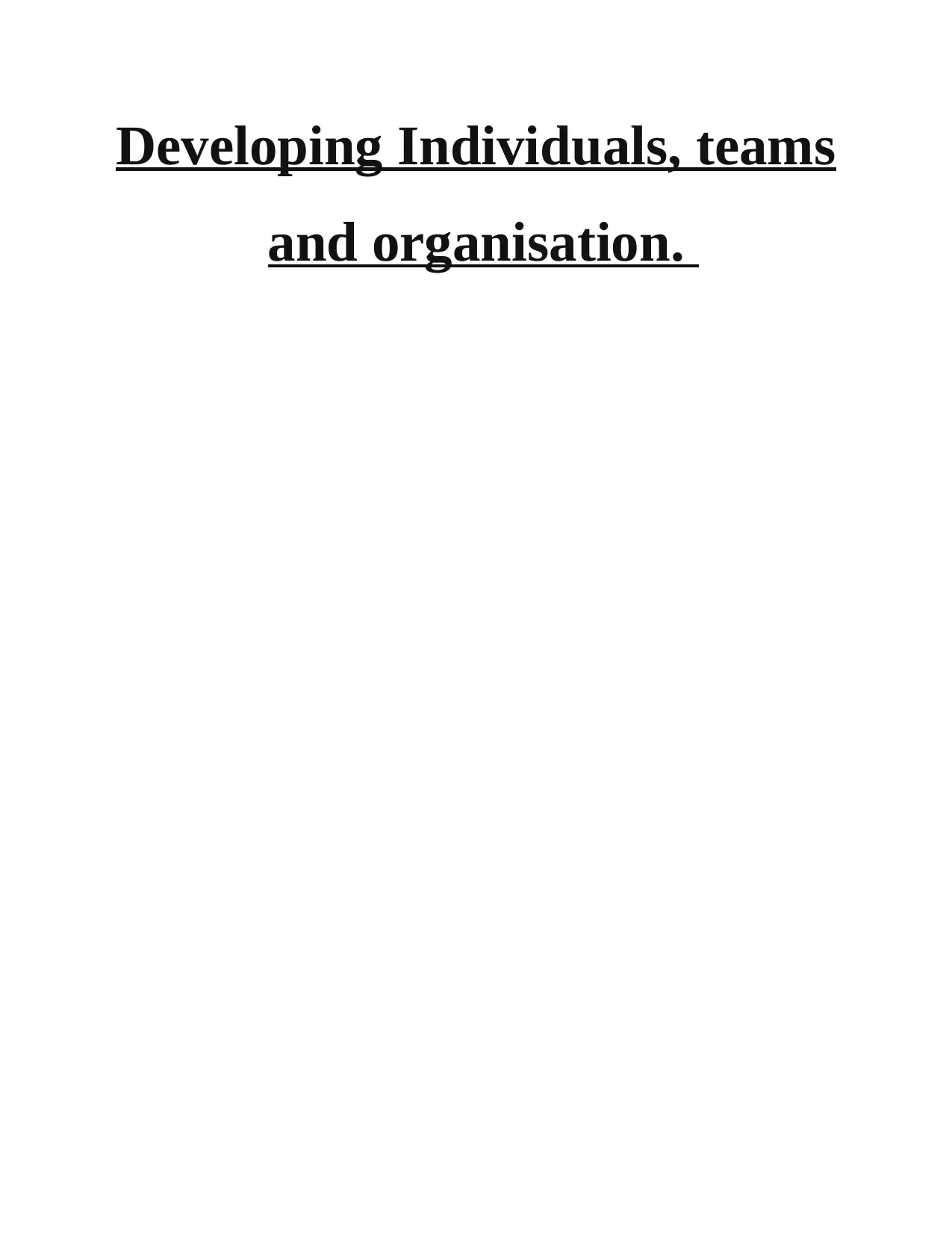
Developing Individuals, teams
and organisation.
and organisation.
Paraphrase This Document
Need a fresh take? Get an instant paraphrase of this document with our AI Paraphraser
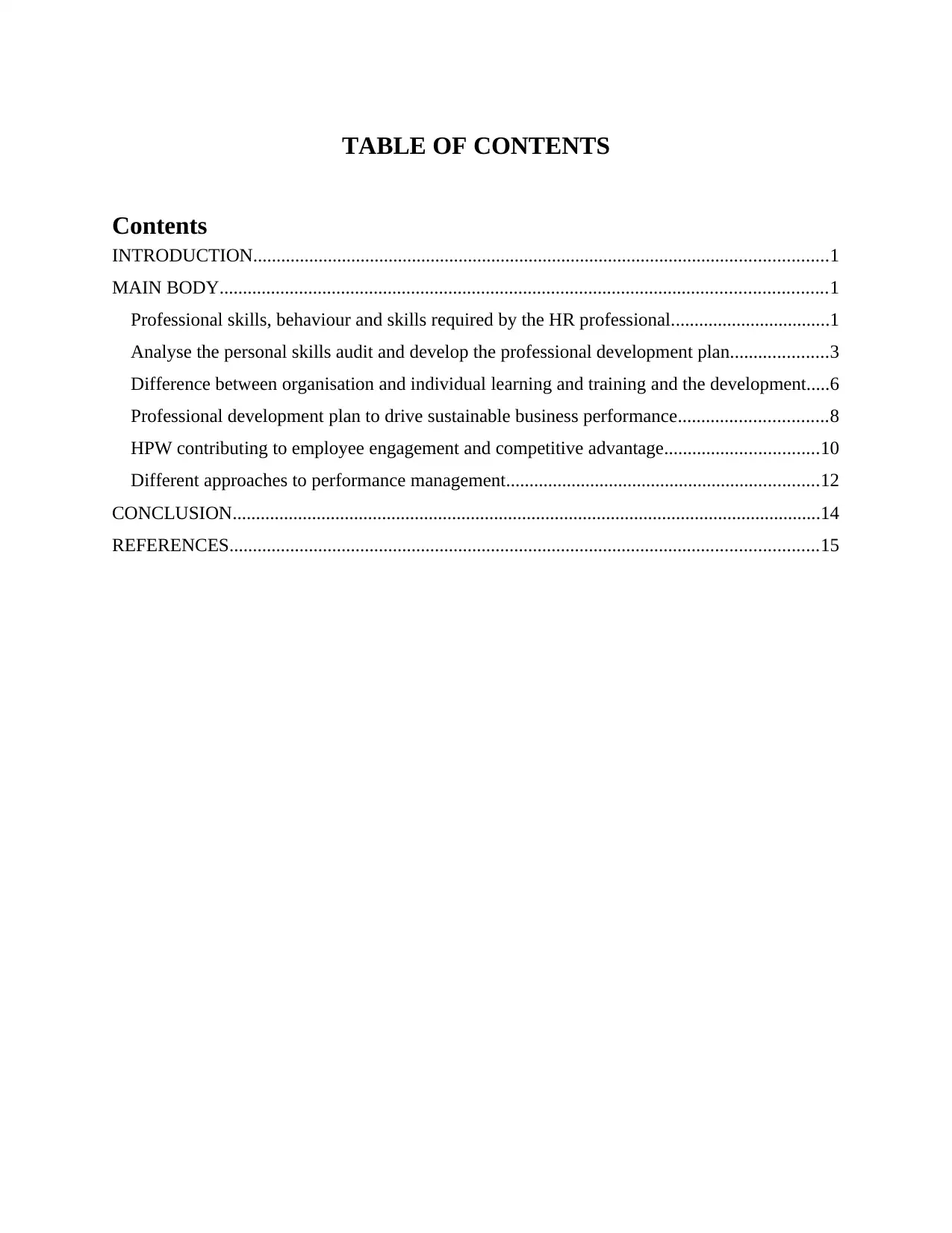
TABLE OF CONTENTS
Contents
INTRODUCTION...........................................................................................................................1
MAIN BODY..................................................................................................................................1
Professional skills, behaviour and skills required by the HR professional..................................1
Analyse the personal skills audit and develop the professional development plan.....................3
Difference between organisation and individual learning and training and the development.....6
Professional development plan to drive sustainable business performance................................8
HPW contributing to employee engagement and competitive advantage.................................10
Different approaches to performance management...................................................................12
CONCLUSION..............................................................................................................................14
REFERENCES..............................................................................................................................15
Contents
INTRODUCTION...........................................................................................................................1
MAIN BODY..................................................................................................................................1
Professional skills, behaviour and skills required by the HR professional..................................1
Analyse the personal skills audit and develop the professional development plan.....................3
Difference between organisation and individual learning and training and the development.....6
Professional development plan to drive sustainable business performance................................8
HPW contributing to employee engagement and competitive advantage.................................10
Different approaches to performance management...................................................................12
CONCLUSION..............................................................................................................................14
REFERENCES..............................................................................................................................15
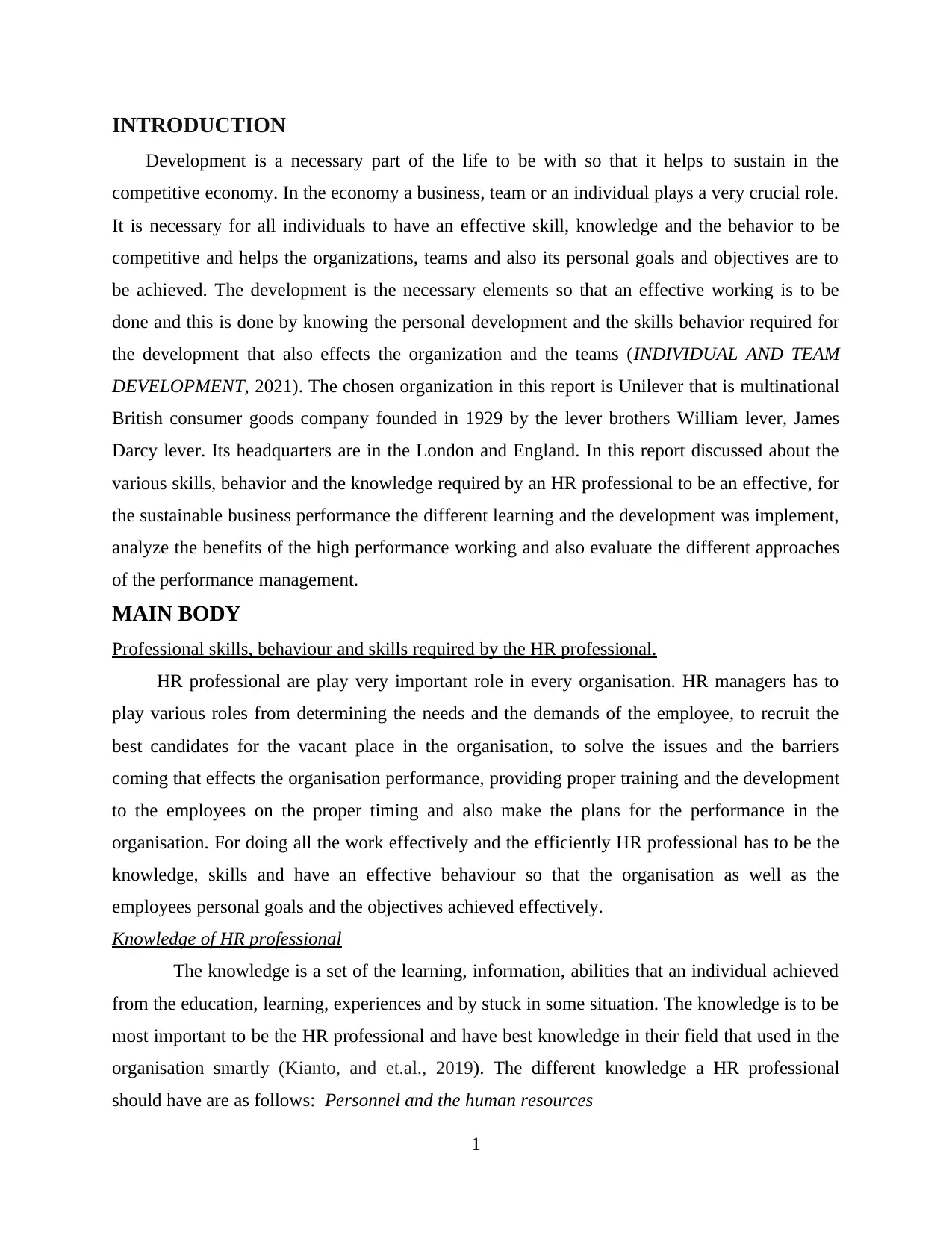
INTRODUCTION
Development is a necessary part of the life to be with so that it helps to sustain in the
competitive economy. In the economy a business, team or an individual plays a very crucial role.
It is necessary for all individuals to have an effective skill, knowledge and the behavior to be
competitive and helps the organizations, teams and also its personal goals and objectives are to
be achieved. The development is the necessary elements so that an effective working is to be
done and this is done by knowing the personal development and the skills behavior required for
the development that also effects the organization and the teams (INDIVIDUAL AND TEAM
DEVELOPMENT, 2021). The chosen organization in this report is Unilever that is multinational
British consumer goods company founded in 1929 by the lever brothers William lever, James
Darcy lever. Its headquarters are in the London and England. In this report discussed about the
various skills, behavior and the knowledge required by an HR professional to be an effective, for
the sustainable business performance the different learning and the development was implement,
analyze the benefits of the high performance working and also evaluate the different approaches
of the performance management.
MAIN BODY
Professional skills, behaviour and skills required by the HR professional.
HR professional are play very important role in every organisation. HR managers has to
play various roles from determining the needs and the demands of the employee, to recruit the
best candidates for the vacant place in the organisation, to solve the issues and the barriers
coming that effects the organisation performance, providing proper training and the development
to the employees on the proper timing and also make the plans for the performance in the
organisation. For doing all the work effectively and the efficiently HR professional has to be the
knowledge, skills and have an effective behaviour so that the organisation as well as the
employees personal goals and the objectives achieved effectively.
Knowledge of HR professional
The knowledge is a set of the learning, information, abilities that an individual achieved
from the education, learning, experiences and by stuck in some situation. The knowledge is to be
most important to be the HR professional and have best knowledge in their field that used in the
organisation smartly (Kianto, and et.al., 2019). The different knowledge a HR professional
should have are as follows: Personnel and the human resources
1
Development is a necessary part of the life to be with so that it helps to sustain in the
competitive economy. In the economy a business, team or an individual plays a very crucial role.
It is necessary for all individuals to have an effective skill, knowledge and the behavior to be
competitive and helps the organizations, teams and also its personal goals and objectives are to
be achieved. The development is the necessary elements so that an effective working is to be
done and this is done by knowing the personal development and the skills behavior required for
the development that also effects the organization and the teams (INDIVIDUAL AND TEAM
DEVELOPMENT, 2021). The chosen organization in this report is Unilever that is multinational
British consumer goods company founded in 1929 by the lever brothers William lever, James
Darcy lever. Its headquarters are in the London and England. In this report discussed about the
various skills, behavior and the knowledge required by an HR professional to be an effective, for
the sustainable business performance the different learning and the development was implement,
analyze the benefits of the high performance working and also evaluate the different approaches
of the performance management.
MAIN BODY
Professional skills, behaviour and skills required by the HR professional.
HR professional are play very important role in every organisation. HR managers has to
play various roles from determining the needs and the demands of the employee, to recruit the
best candidates for the vacant place in the organisation, to solve the issues and the barriers
coming that effects the organisation performance, providing proper training and the development
to the employees on the proper timing and also make the plans for the performance in the
organisation. For doing all the work effectively and the efficiently HR professional has to be the
knowledge, skills and have an effective behaviour so that the organisation as well as the
employees personal goals and the objectives achieved effectively.
Knowledge of HR professional
The knowledge is a set of the learning, information, abilities that an individual achieved
from the education, learning, experiences and by stuck in some situation. The knowledge is to be
most important to be the HR professional and have best knowledge in their field that used in the
organisation smartly (Kianto, and et.al., 2019). The different knowledge a HR professional
should have are as follows: Personnel and the human resources
1
⊘ This is a preview!⊘
Do you want full access?
Subscribe today to unlock all pages.

Trusted by 1+ million students worldwide
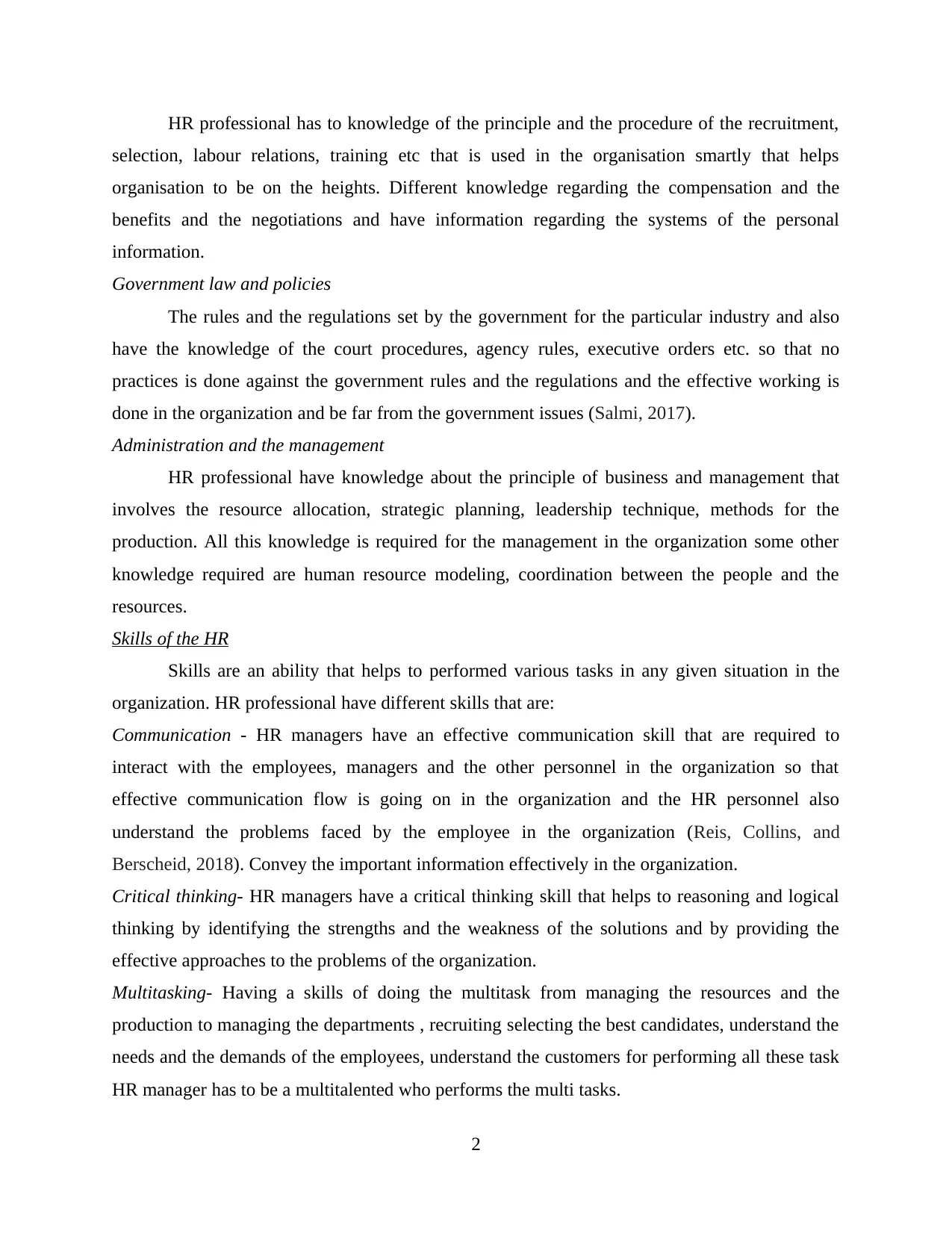
HR professional has to knowledge of the principle and the procedure of the recruitment,
selection, labour relations, training etc that is used in the organisation smartly that helps
organisation to be on the heights. Different knowledge regarding the compensation and the
benefits and the negotiations and have information regarding the systems of the personal
information.
Government law and policies
The rules and the regulations set by the government for the particular industry and also
have the knowledge of the court procedures, agency rules, executive orders etc. so that no
practices is done against the government rules and the regulations and the effective working is
done in the organization and be far from the government issues (Salmi, 2017).
Administration and the management
HR professional have knowledge about the principle of business and management that
involves the resource allocation, strategic planning, leadership technique, methods for the
production. All this knowledge is required for the management in the organization some other
knowledge required are human resource modeling, coordination between the people and the
resources.
Skills of the HR
Skills are an ability that helps to performed various tasks in any given situation in the
organization. HR professional have different skills that are:
Communication - HR managers have an effective communication skill that are required to
interact with the employees, managers and the other personnel in the organization so that
effective communication flow is going on in the organization and the HR personnel also
understand the problems faced by the employee in the organization (Reis, Collins, and
Berscheid, 2018). Convey the important information effectively in the organization.
Critical thinking- HR managers have a critical thinking skill that helps to reasoning and logical
thinking by identifying the strengths and the weakness of the solutions and by providing the
effective approaches to the problems of the organization.
Multitasking- Having a skills of doing the multitask from managing the resources and the
production to managing the departments , recruiting selecting the best candidates, understand the
needs and the demands of the employees, understand the customers for performing all these task
HR manager has to be a multitalented who performs the multi tasks.
2
selection, labour relations, training etc that is used in the organisation smartly that helps
organisation to be on the heights. Different knowledge regarding the compensation and the
benefits and the negotiations and have information regarding the systems of the personal
information.
Government law and policies
The rules and the regulations set by the government for the particular industry and also
have the knowledge of the court procedures, agency rules, executive orders etc. so that no
practices is done against the government rules and the regulations and the effective working is
done in the organization and be far from the government issues (Salmi, 2017).
Administration and the management
HR professional have knowledge about the principle of business and management that
involves the resource allocation, strategic planning, leadership technique, methods for the
production. All this knowledge is required for the management in the organization some other
knowledge required are human resource modeling, coordination between the people and the
resources.
Skills of the HR
Skills are an ability that helps to performed various tasks in any given situation in the
organization. HR professional have different skills that are:
Communication - HR managers have an effective communication skill that are required to
interact with the employees, managers and the other personnel in the organization so that
effective communication flow is going on in the organization and the HR personnel also
understand the problems faced by the employee in the organization (Reis, Collins, and
Berscheid, 2018). Convey the important information effectively in the organization.
Critical thinking- HR managers have a critical thinking skill that helps to reasoning and logical
thinking by identifying the strengths and the weakness of the solutions and by providing the
effective approaches to the problems of the organization.
Multitasking- Having a skills of doing the multitask from managing the resources and the
production to managing the departments , recruiting selecting the best candidates, understand the
needs and the demands of the employees, understand the customers for performing all these task
HR manager has to be a multitalented who performs the multi tasks.
2
Paraphrase This Document
Need a fresh take? Get an instant paraphrase of this document with our AI Paraphraser
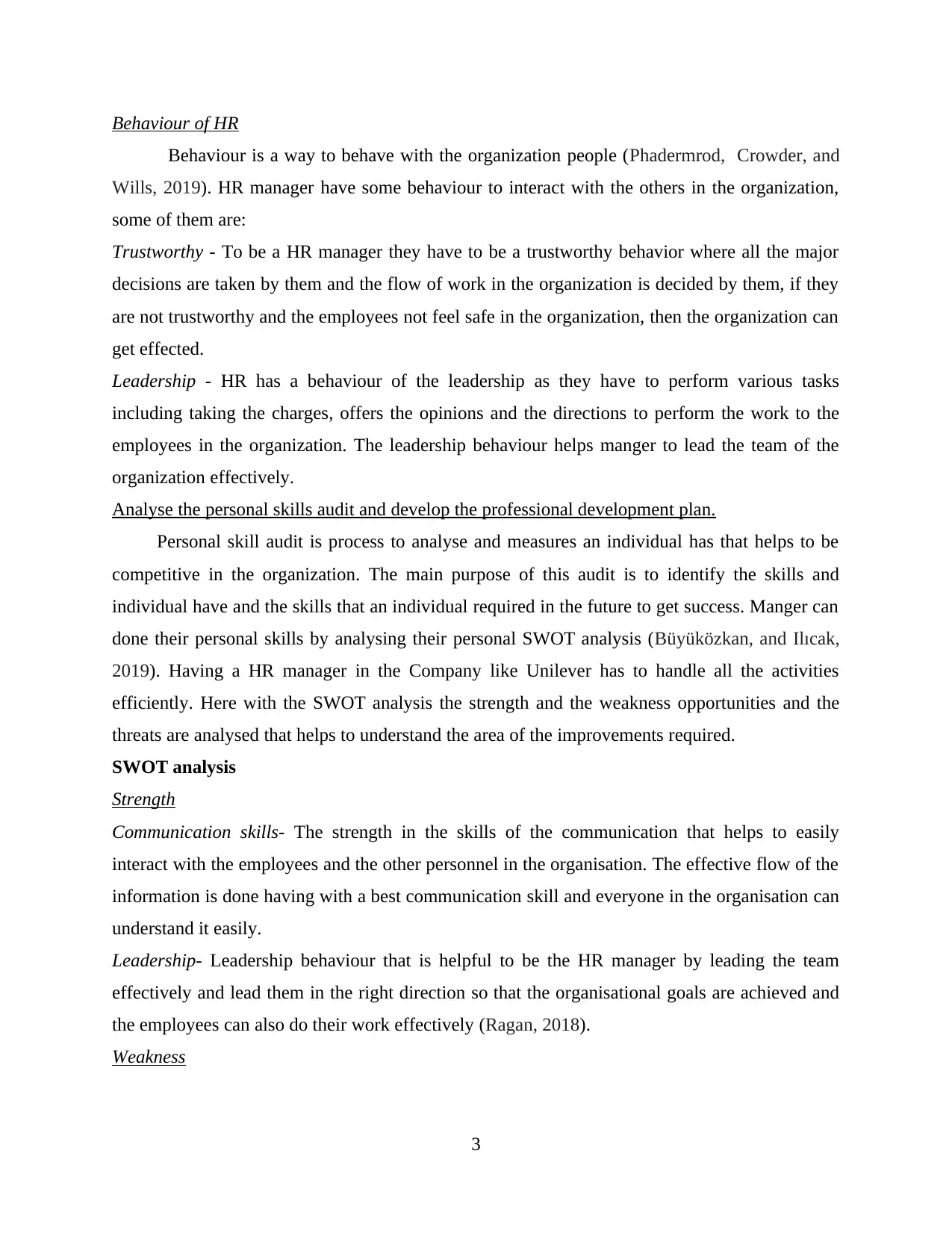
Behaviour of HR
Behaviour is a way to behave with the organization people (Phadermrod, Crowder, and
Wills, 2019). HR manager have some behaviour to interact with the others in the organization,
some of them are:
Trustworthy - To be a HR manager they have to be a trustworthy behavior where all the major
decisions are taken by them and the flow of work in the organization is decided by them, if they
are not trustworthy and the employees not feel safe in the organization, then the organization can
get effected.
Leadership - HR has a behaviour of the leadership as they have to perform various tasks
including taking the charges, offers the opinions and the directions to perform the work to the
employees in the organization. The leadership behaviour helps manger to lead the team of the
organization effectively.
Analyse the personal skills audit and develop the professional development plan.
Personal skill audit is process to analyse and measures an individual has that helps to be
competitive in the organization. The main purpose of this audit is to identify the skills and
individual have and the skills that an individual required in the future to get success. Manger can
done their personal skills by analysing their personal SWOT analysis (Büyüközkan, and Ilıcak,
2019). Having a HR manager in the Company like Unilever has to handle all the activities
efficiently. Here with the SWOT analysis the strength and the weakness opportunities and the
threats are analysed that helps to understand the area of the improvements required.
SWOT analysis
Strength
Communication skills- The strength in the skills of the communication that helps to easily
interact with the employees and the other personnel in the organisation. The effective flow of the
information is done having with a best communication skill and everyone in the organisation can
understand it easily.
Leadership- Leadership behaviour that is helpful to be the HR manager by leading the team
effectively and lead them in the right direction so that the organisational goals are achieved and
the employees can also do their work effectively (Ragan, 2018).
Weakness
3
Behaviour is a way to behave with the organization people (Phadermrod, Crowder, and
Wills, 2019). HR manager have some behaviour to interact with the others in the organization,
some of them are:
Trustworthy - To be a HR manager they have to be a trustworthy behavior where all the major
decisions are taken by them and the flow of work in the organization is decided by them, if they
are not trustworthy and the employees not feel safe in the organization, then the organization can
get effected.
Leadership - HR has a behaviour of the leadership as they have to perform various tasks
including taking the charges, offers the opinions and the directions to perform the work to the
employees in the organization. The leadership behaviour helps manger to lead the team of the
organization effectively.
Analyse the personal skills audit and develop the professional development plan.
Personal skill audit is process to analyse and measures an individual has that helps to be
competitive in the organization. The main purpose of this audit is to identify the skills and
individual have and the skills that an individual required in the future to get success. Manger can
done their personal skills by analysing their personal SWOT analysis (Büyüközkan, and Ilıcak,
2019). Having a HR manager in the Company like Unilever has to handle all the activities
efficiently. Here with the SWOT analysis the strength and the weakness opportunities and the
threats are analysed that helps to understand the area of the improvements required.
SWOT analysis
Strength
Communication skills- The strength in the skills of the communication that helps to easily
interact with the employees and the other personnel in the organisation. The effective flow of the
information is done having with a best communication skill and everyone in the organisation can
understand it easily.
Leadership- Leadership behaviour that is helpful to be the HR manager by leading the team
effectively and lead them in the right direction so that the organisational goals are achieved and
the employees can also do their work effectively (Ragan, 2018).
Weakness
3
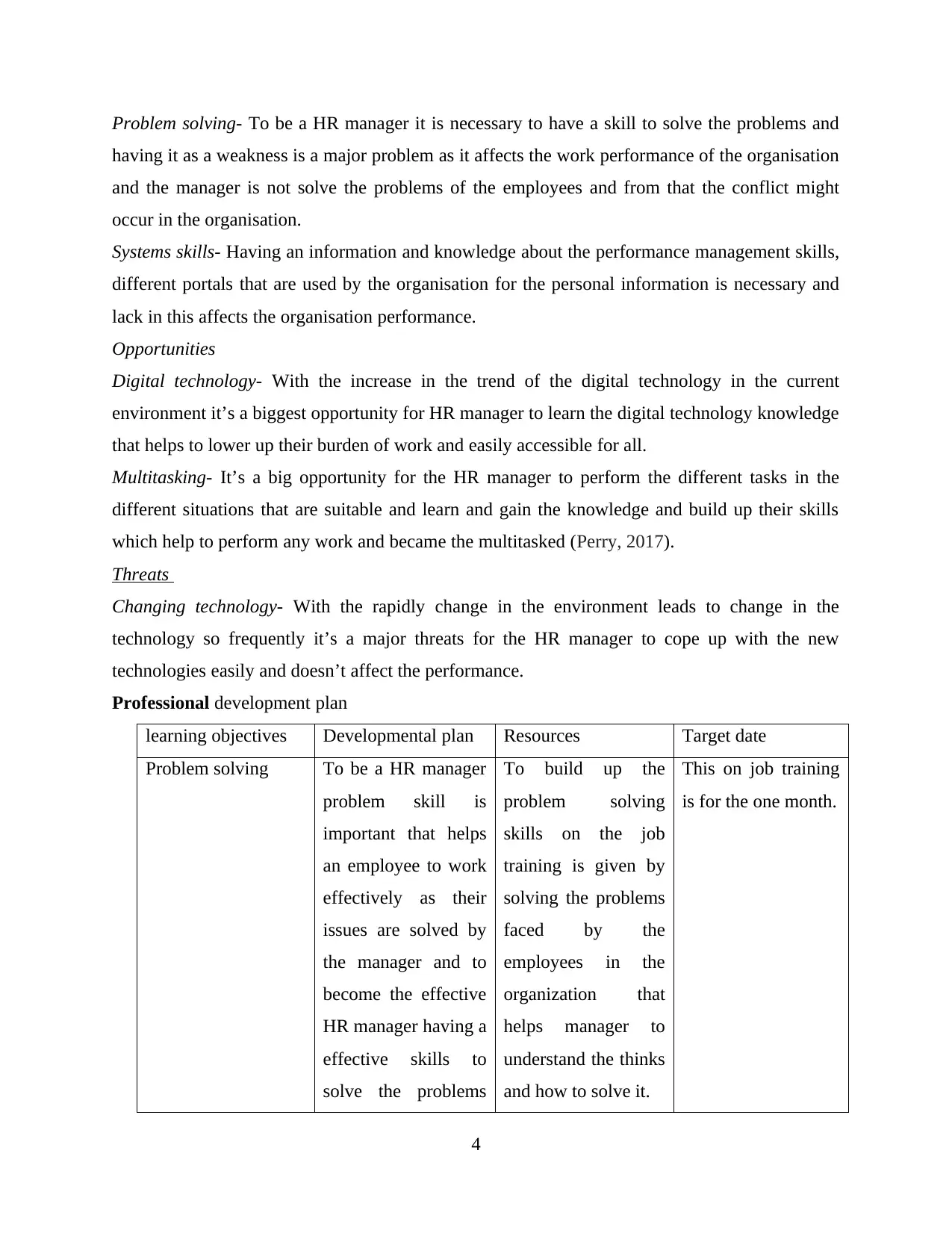
Problem solving- To be a HR manager it is necessary to have a skill to solve the problems and
having it as a weakness is a major problem as it affects the work performance of the organisation
and the manager is not solve the problems of the employees and from that the conflict might
occur in the organisation.
Systems skills- Having an information and knowledge about the performance management skills,
different portals that are used by the organisation for the personal information is necessary and
lack in this affects the organisation performance.
Opportunities
Digital technology- With the increase in the trend of the digital technology in the current
environment it’s a biggest opportunity for HR manager to learn the digital technology knowledge
that helps to lower up their burden of work and easily accessible for all.
Multitasking- It’s a big opportunity for the HR manager to perform the different tasks in the
different situations that are suitable and learn and gain the knowledge and build up their skills
which help to perform any work and became the multitasked (Perry, 2017).
Threats
Changing technology- With the rapidly change in the environment leads to change in the
technology so frequently it’s a major threats for the HR manager to cope up with the new
technologies easily and doesn’t affect the performance.
Professional development plan
learning objectives Developmental plan Resources Target date
Problem solving To be a HR manager
problem skill is
important that helps
an employee to work
effectively as their
issues are solved by
the manager and to
become the effective
HR manager having a
effective skills to
solve the problems
To build up the
problem solving
skills on the job
training is given by
solving the problems
faced by the
employees in the
organization that
helps manager to
understand the thinks
and how to solve it.
This on job training
is for the one month.
4
having it as a weakness is a major problem as it affects the work performance of the organisation
and the manager is not solve the problems of the employees and from that the conflict might
occur in the organisation.
Systems skills- Having an information and knowledge about the performance management skills,
different portals that are used by the organisation for the personal information is necessary and
lack in this affects the organisation performance.
Opportunities
Digital technology- With the increase in the trend of the digital technology in the current
environment it’s a biggest opportunity for HR manager to learn the digital technology knowledge
that helps to lower up their burden of work and easily accessible for all.
Multitasking- It’s a big opportunity for the HR manager to perform the different tasks in the
different situations that are suitable and learn and gain the knowledge and build up their skills
which help to perform any work and became the multitasked (Perry, 2017).
Threats
Changing technology- With the rapidly change in the environment leads to change in the
technology so frequently it’s a major threats for the HR manager to cope up with the new
technologies easily and doesn’t affect the performance.
Professional development plan
learning objectives Developmental plan Resources Target date
Problem solving To be a HR manager
problem skill is
important that helps
an employee to work
effectively as their
issues are solved by
the manager and to
become the effective
HR manager having a
effective skills to
solve the problems
To build up the
problem solving
skills on the job
training is given by
solving the problems
faced by the
employees in the
organization that
helps manager to
understand the thinks
and how to solve it.
This on job training
is for the one month.
4
⊘ This is a preview!⊘
Do you want full access?
Subscribe today to unlock all pages.

Trusted by 1+ million students worldwide
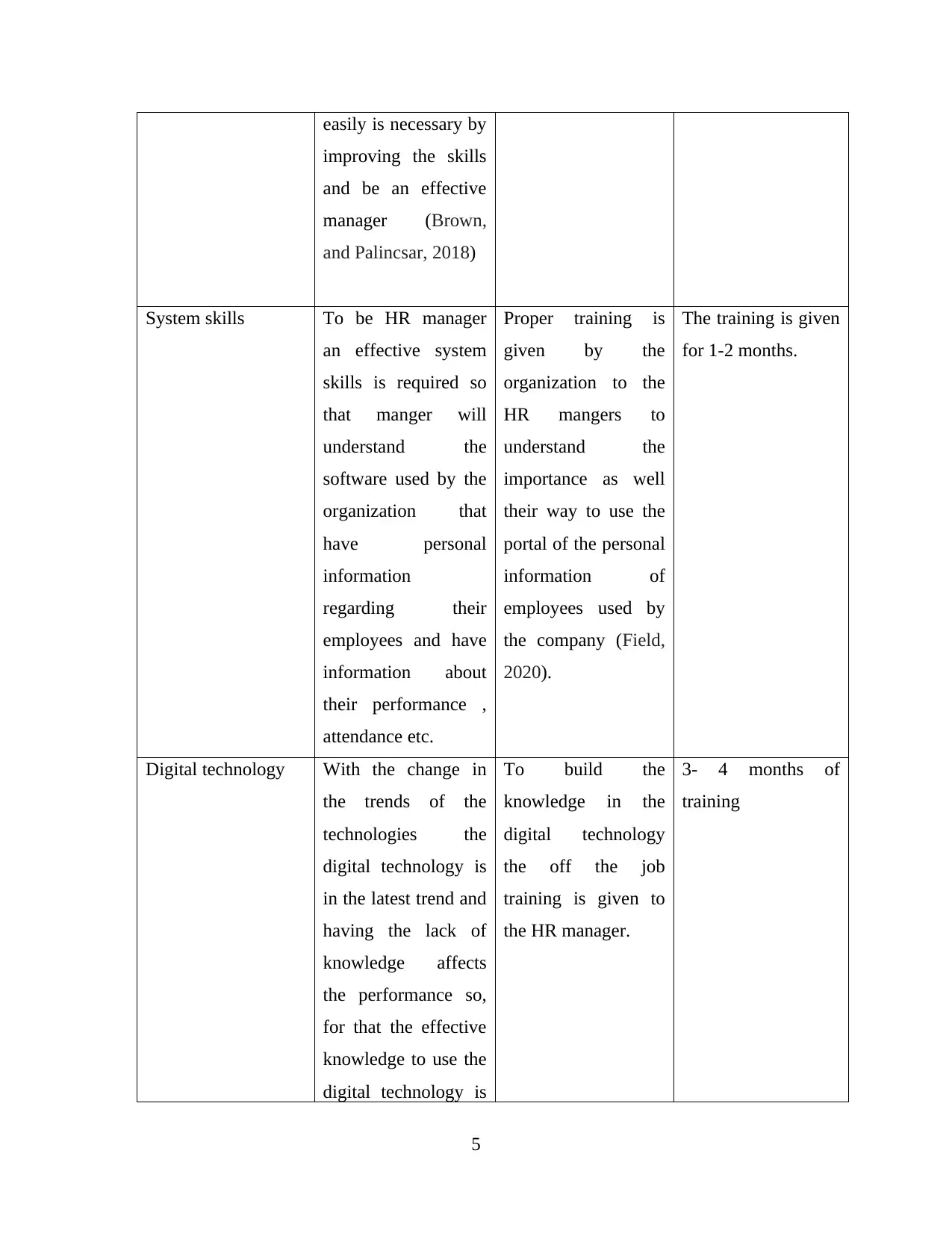
easily is necessary by
improving the skills
and be an effective
manager (Brown,
and Palincsar, 2018)
System skills To be HR manager
an effective system
skills is required so
that manger will
understand the
software used by the
organization that
have personal
information
regarding their
employees and have
information about
their performance ,
attendance etc.
Proper training is
given by the
organization to the
HR mangers to
understand the
importance as well
their way to use the
portal of the personal
information of
employees used by
the company (Field,
2020).
The training is given
for 1-2 months.
Digital technology With the change in
the trends of the
technologies the
digital technology is
in the latest trend and
having the lack of
knowledge affects
the performance so,
for that the effective
knowledge to use the
digital technology is
To build the
knowledge in the
digital technology
the off the job
training is given to
the HR manager.
3- 4 months of
training
5
improving the skills
and be an effective
manager (Brown,
and Palincsar, 2018)
System skills To be HR manager
an effective system
skills is required so
that manger will
understand the
software used by the
organization that
have personal
information
regarding their
employees and have
information about
their performance ,
attendance etc.
Proper training is
given by the
organization to the
HR mangers to
understand the
importance as well
their way to use the
portal of the personal
information of
employees used by
the company (Field,
2020).
The training is given
for 1-2 months.
Digital technology With the change in
the trends of the
technologies the
digital technology is
in the latest trend and
having the lack of
knowledge affects
the performance so,
for that the effective
knowledge to use the
digital technology is
To build the
knowledge in the
digital technology
the off the job
training is given to
the HR manager.
3- 4 months of
training
5
Paraphrase This Document
Need a fresh take? Get an instant paraphrase of this document with our AI Paraphraser
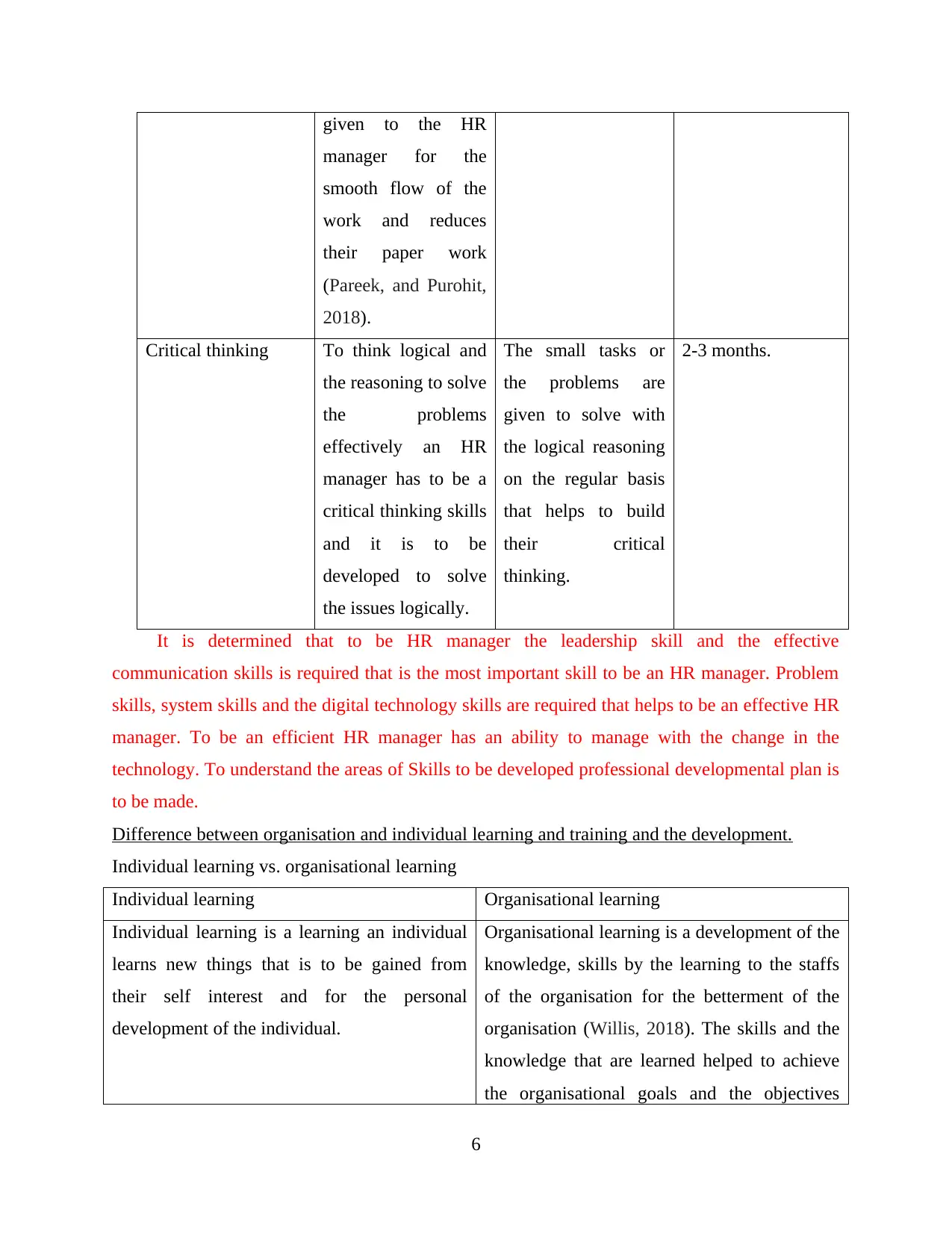
given to the HR
manager for the
smooth flow of the
work and reduces
their paper work
(Pareek, and Purohit,
2018).
Critical thinking To think logical and
the reasoning to solve
the problems
effectively an HR
manager has to be a
critical thinking skills
and it is to be
developed to solve
the issues logically.
The small tasks or
the problems are
given to solve with
the logical reasoning
on the regular basis
that helps to build
their critical
thinking.
2-3 months.
It is determined that to be HR manager the leadership skill and the effective
communication skills is required that is the most important skill to be an HR manager. Problem
skills, system skills and the digital technology skills are required that helps to be an effective HR
manager. To be an efficient HR manager has an ability to manage with the change in the
technology. To understand the areas of Skills to be developed professional developmental plan is
to be made.
Difference between organisation and individual learning and training and the development.
Individual learning vs. organisational learning
Individual learning Organisational learning
Individual learning is a learning an individual
learns new things that is to be gained from
their self interest and for the personal
development of the individual.
Organisational learning is a development of the
knowledge, skills by the learning to the staffs
of the organisation for the betterment of the
organisation (Willis, 2018). The skills and the
knowledge that are learned helped to achieve
the organisational goals and the objectives
6
manager for the
smooth flow of the
work and reduces
their paper work
(Pareek, and Purohit,
2018).
Critical thinking To think logical and
the reasoning to solve
the problems
effectively an HR
manager has to be a
critical thinking skills
and it is to be
developed to solve
the issues logically.
The small tasks or
the problems are
given to solve with
the logical reasoning
on the regular basis
that helps to build
their critical
thinking.
2-3 months.
It is determined that to be HR manager the leadership skill and the effective
communication skills is required that is the most important skill to be an HR manager. Problem
skills, system skills and the digital technology skills are required that helps to be an effective HR
manager. To be an efficient HR manager has an ability to manage with the change in the
technology. To understand the areas of Skills to be developed professional developmental plan is
to be made.
Difference between organisation and individual learning and training and the development.
Individual learning vs. organisational learning
Individual learning Organisational learning
Individual learning is a learning an individual
learns new things that is to be gained from
their self interest and for the personal
development of the individual.
Organisational learning is a development of the
knowledge, skills by the learning to the staffs
of the organisation for the betterment of the
organisation (Willis, 2018). The skills and the
knowledge that are learned helped to achieve
the organisational goals and the objectives
6
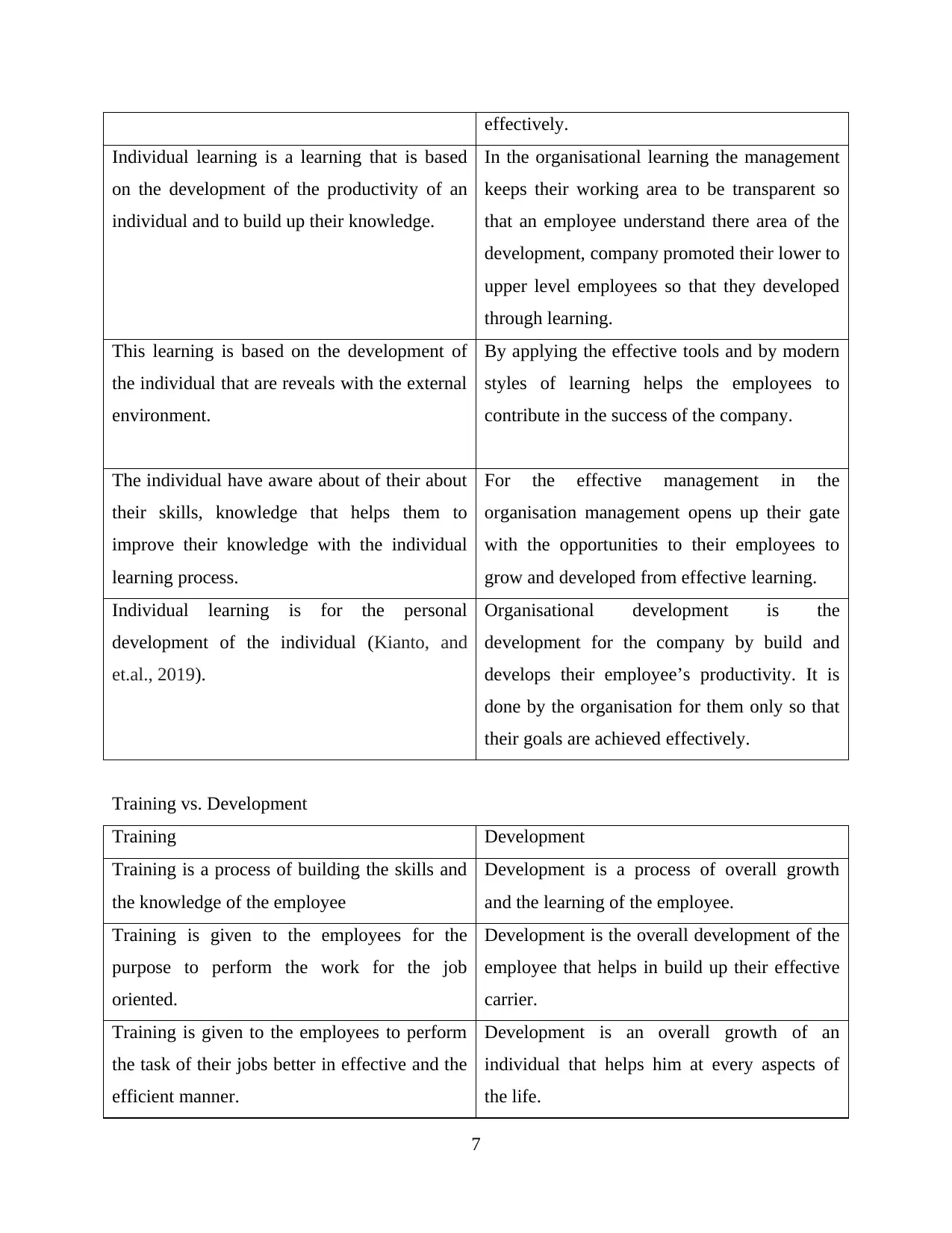
effectively.
Individual learning is a learning that is based
on the development of the productivity of an
individual and to build up their knowledge.
In the organisational learning the management
keeps their working area to be transparent so
that an employee understand there area of the
development, company promoted their lower to
upper level employees so that they developed
through learning.
This learning is based on the development of
the individual that are reveals with the external
environment.
By applying the effective tools and by modern
styles of learning helps the employees to
contribute in the success of the company.
The individual have aware about of their about
their skills, knowledge that helps them to
improve their knowledge with the individual
learning process.
For the effective management in the
organisation management opens up their gate
with the opportunities to their employees to
grow and developed from effective learning.
Individual learning is for the personal
development of the individual (Kianto, and
et.al., 2019).
Organisational development is the
development for the company by build and
develops their employee’s productivity. It is
done by the organisation for them only so that
their goals are achieved effectively.
Training vs. Development
Training Development
Training is a process of building the skills and
the knowledge of the employee
Development is a process of overall growth
and the learning of the employee.
Training is given to the employees for the
purpose to perform the work for the job
oriented.
Development is the overall development of the
employee that helps in build up their effective
carrier.
Training is given to the employees to perform
the task of their jobs better in effective and the
efficient manner.
Development is an overall growth of an
individual that helps him at every aspects of
the life.
7
Individual learning is a learning that is based
on the development of the productivity of an
individual and to build up their knowledge.
In the organisational learning the management
keeps their working area to be transparent so
that an employee understand there area of the
development, company promoted their lower to
upper level employees so that they developed
through learning.
This learning is based on the development of
the individual that are reveals with the external
environment.
By applying the effective tools and by modern
styles of learning helps the employees to
contribute in the success of the company.
The individual have aware about of their about
their skills, knowledge that helps them to
improve their knowledge with the individual
learning process.
For the effective management in the
organisation management opens up their gate
with the opportunities to their employees to
grow and developed from effective learning.
Individual learning is for the personal
development of the individual (Kianto, and
et.al., 2019).
Organisational development is the
development for the company by build and
develops their employee’s productivity. It is
done by the organisation for them only so that
their goals are achieved effectively.
Training vs. Development
Training Development
Training is a process of building the skills and
the knowledge of the employee
Development is a process of overall growth
and the learning of the employee.
Training is given to the employees for the
purpose to perform the work for the job
oriented.
Development is the overall development of the
employee that helps in build up their effective
carrier.
Training is given to the employees to perform
the task of their jobs better in effective and the
efficient manner.
Development is an overall growth of an
individual that helps him at every aspects of
the life.
7
⊘ This is a preview!⊘
Do you want full access?
Subscribe today to unlock all pages.

Trusted by 1+ million students worldwide
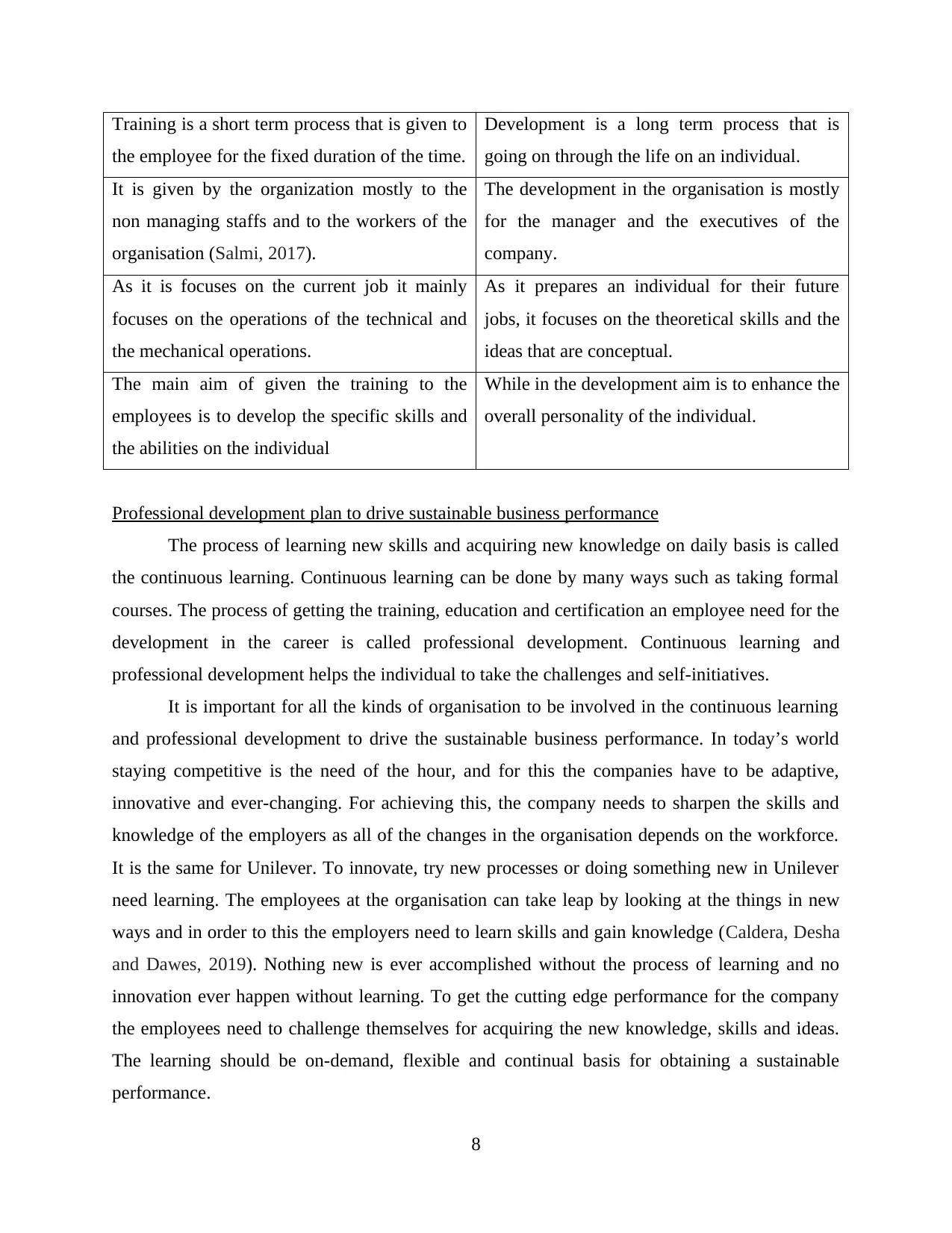
Training is a short term process that is given to
the employee for the fixed duration of the time.
Development is a long term process that is
going on through the life on an individual.
It is given by the organization mostly to the
non managing staffs and to the workers of the
organisation (Salmi, 2017).
The development in the organisation is mostly
for the manager and the executives of the
company.
As it is focuses on the current job it mainly
focuses on the operations of the technical and
the mechanical operations.
As it prepares an individual for their future
jobs, it focuses on the theoretical skills and the
ideas that are conceptual.
The main aim of given the training to the
employees is to develop the specific skills and
the abilities on the individual
While in the development aim is to enhance the
overall personality of the individual.
Professional development plan to drive sustainable business performance
The process of learning new skills and acquiring new knowledge on daily basis is called
the continuous learning. Continuous learning can be done by many ways such as taking formal
courses. The process of getting the training, education and certification an employee need for the
development in the career is called professional development. Continuous learning and
professional development helps the individual to take the challenges and self-initiatives.
It is important for all the kinds of organisation to be involved in the continuous learning
and professional development to drive the sustainable business performance. In today’s world
staying competitive is the need of the hour, and for this the companies have to be adaptive,
innovative and ever-changing. For achieving this, the company needs to sharpen the skills and
knowledge of the employers as all of the changes in the organisation depends on the workforce.
It is the same for Unilever. To innovate, try new processes or doing something new in Unilever
need learning. The employees at the organisation can take leap by looking at the things in new
ways and in order to this the employers need to learn skills and gain knowledge (Caldera, Desha
and Dawes, 2019). Nothing new is ever accomplished without the process of learning and no
innovation ever happen without learning. To get the cutting edge performance for the company
the employees need to challenge themselves for acquiring the new knowledge, skills and ideas.
The learning should be on-demand, flexible and continual basis for obtaining a sustainable
performance.
8
the employee for the fixed duration of the time.
Development is a long term process that is
going on through the life on an individual.
It is given by the organization mostly to the
non managing staffs and to the workers of the
organisation (Salmi, 2017).
The development in the organisation is mostly
for the manager and the executives of the
company.
As it is focuses on the current job it mainly
focuses on the operations of the technical and
the mechanical operations.
As it prepares an individual for their future
jobs, it focuses on the theoretical skills and the
ideas that are conceptual.
The main aim of given the training to the
employees is to develop the specific skills and
the abilities on the individual
While in the development aim is to enhance the
overall personality of the individual.
Professional development plan to drive sustainable business performance
The process of learning new skills and acquiring new knowledge on daily basis is called
the continuous learning. Continuous learning can be done by many ways such as taking formal
courses. The process of getting the training, education and certification an employee need for the
development in the career is called professional development. Continuous learning and
professional development helps the individual to take the challenges and self-initiatives.
It is important for all the kinds of organisation to be involved in the continuous learning
and professional development to drive the sustainable business performance. In today’s world
staying competitive is the need of the hour, and for this the companies have to be adaptive,
innovative and ever-changing. For achieving this, the company needs to sharpen the skills and
knowledge of the employers as all of the changes in the organisation depends on the workforce.
It is the same for Unilever. To innovate, try new processes or doing something new in Unilever
need learning. The employees at the organisation can take leap by looking at the things in new
ways and in order to this the employers need to learn skills and gain knowledge (Caldera, Desha
and Dawes, 2019). Nothing new is ever accomplished without the process of learning and no
innovation ever happen without learning. To get the cutting edge performance for the company
the employees need to challenge themselves for acquiring the new knowledge, skills and ideas.
The learning should be on-demand, flexible and continual basis for obtaining a sustainable
performance.
8
Paraphrase This Document
Need a fresh take? Get an instant paraphrase of this document with our AI Paraphraser
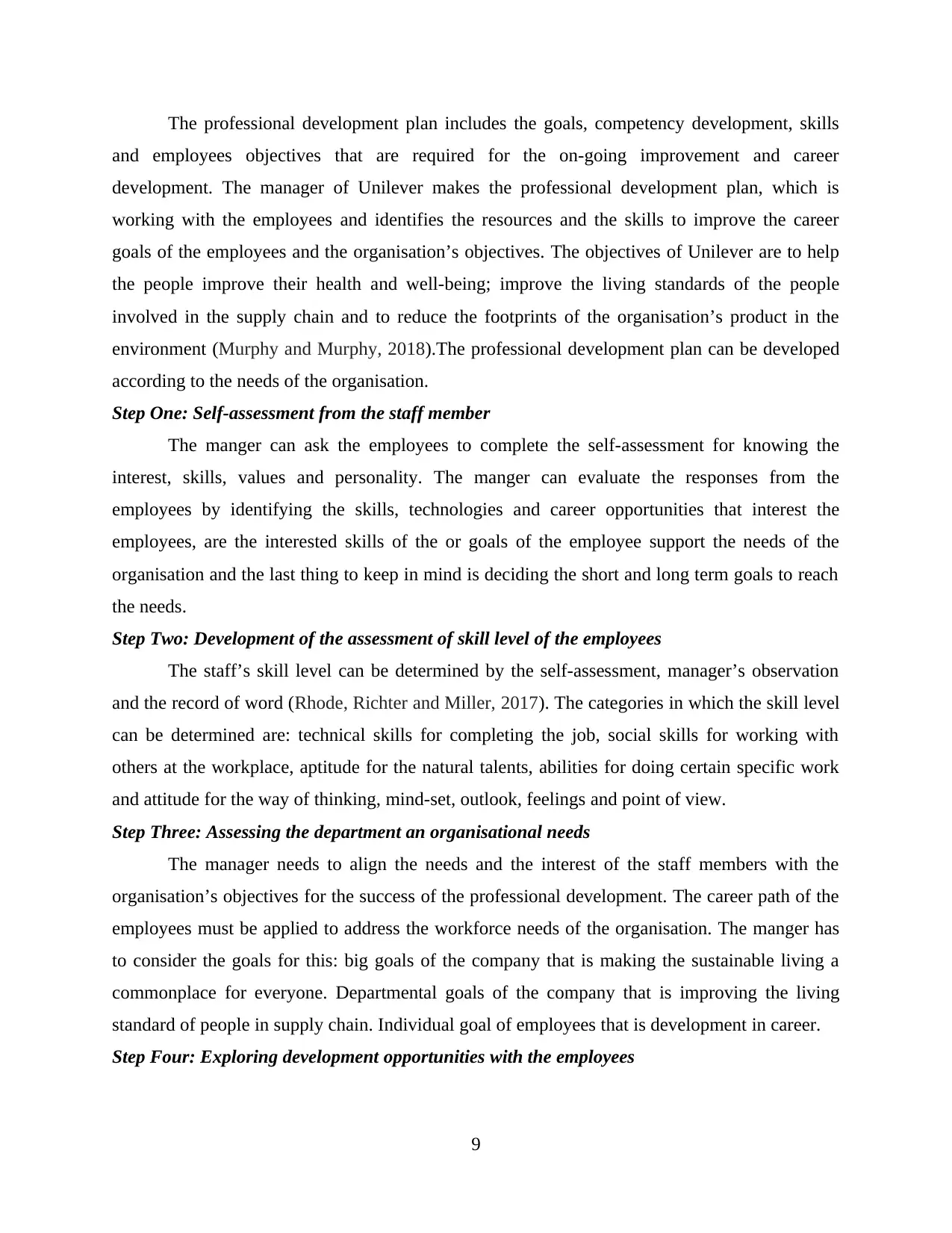
The professional development plan includes the goals, competency development, skills
and employees objectives that are required for the on-going improvement and career
development. The manager of Unilever makes the professional development plan, which is
working with the employees and identifies the resources and the skills to improve the career
goals of the employees and the organisation’s objectives. The objectives of Unilever are to help
the people improve their health and well-being; improve the living standards of the people
involved in the supply chain and to reduce the footprints of the organisation’s product in the
environment (Murphy and Murphy, 2018).The professional development plan can be developed
according to the needs of the organisation.
Step One: Self-assessment from the staff member
The manger can ask the employees to complete the self-assessment for knowing the
interest, skills, values and personality. The manger can evaluate the responses from the
employees by identifying the skills, technologies and career opportunities that interest the
employees, are the interested skills of the or goals of the employee support the needs of the
organisation and the last thing to keep in mind is deciding the short and long term goals to reach
the needs.
Step Two: Development of the assessment of skill level of the employees
The staff’s skill level can be determined by the self-assessment, manager’s observation
and the record of word (Rhode, Richter and Miller, 2017). The categories in which the skill level
can be determined are: technical skills for completing the job, social skills for working with
others at the workplace, aptitude for the natural talents, abilities for doing certain specific work
and attitude for the way of thinking, mind-set, outlook, feelings and point of view.
Step Three: Assessing the department an organisational needs
The manager needs to align the needs and the interest of the staff members with the
organisation’s objectives for the success of the professional development. The career path of the
employees must be applied to address the workforce needs of the organisation. The manger has
to consider the goals for this: big goals of the company that is making the sustainable living a
commonplace for everyone. Departmental goals of the company that is improving the living
standard of people in supply chain. Individual goal of employees that is development in career.
Step Four: Exploring development opportunities with the employees
9
and employees objectives that are required for the on-going improvement and career
development. The manager of Unilever makes the professional development plan, which is
working with the employees and identifies the resources and the skills to improve the career
goals of the employees and the organisation’s objectives. The objectives of Unilever are to help
the people improve their health and well-being; improve the living standards of the people
involved in the supply chain and to reduce the footprints of the organisation’s product in the
environment (Murphy and Murphy, 2018).The professional development plan can be developed
according to the needs of the organisation.
Step One: Self-assessment from the staff member
The manger can ask the employees to complete the self-assessment for knowing the
interest, skills, values and personality. The manger can evaluate the responses from the
employees by identifying the skills, technologies and career opportunities that interest the
employees, are the interested skills of the or goals of the employee support the needs of the
organisation and the last thing to keep in mind is deciding the short and long term goals to reach
the needs.
Step Two: Development of the assessment of skill level of the employees
The staff’s skill level can be determined by the self-assessment, manager’s observation
and the record of word (Rhode, Richter and Miller, 2017). The categories in which the skill level
can be determined are: technical skills for completing the job, social skills for working with
others at the workplace, aptitude for the natural talents, abilities for doing certain specific work
and attitude for the way of thinking, mind-set, outlook, feelings and point of view.
Step Three: Assessing the department an organisational needs
The manager needs to align the needs and the interest of the staff members with the
organisation’s objectives for the success of the professional development. The career path of the
employees must be applied to address the workforce needs of the organisation. The manger has
to consider the goals for this: big goals of the company that is making the sustainable living a
commonplace for everyone. Departmental goals of the company that is improving the living
standard of people in supply chain. Individual goal of employees that is development in career.
Step Four: Exploring development opportunities with the employees
9
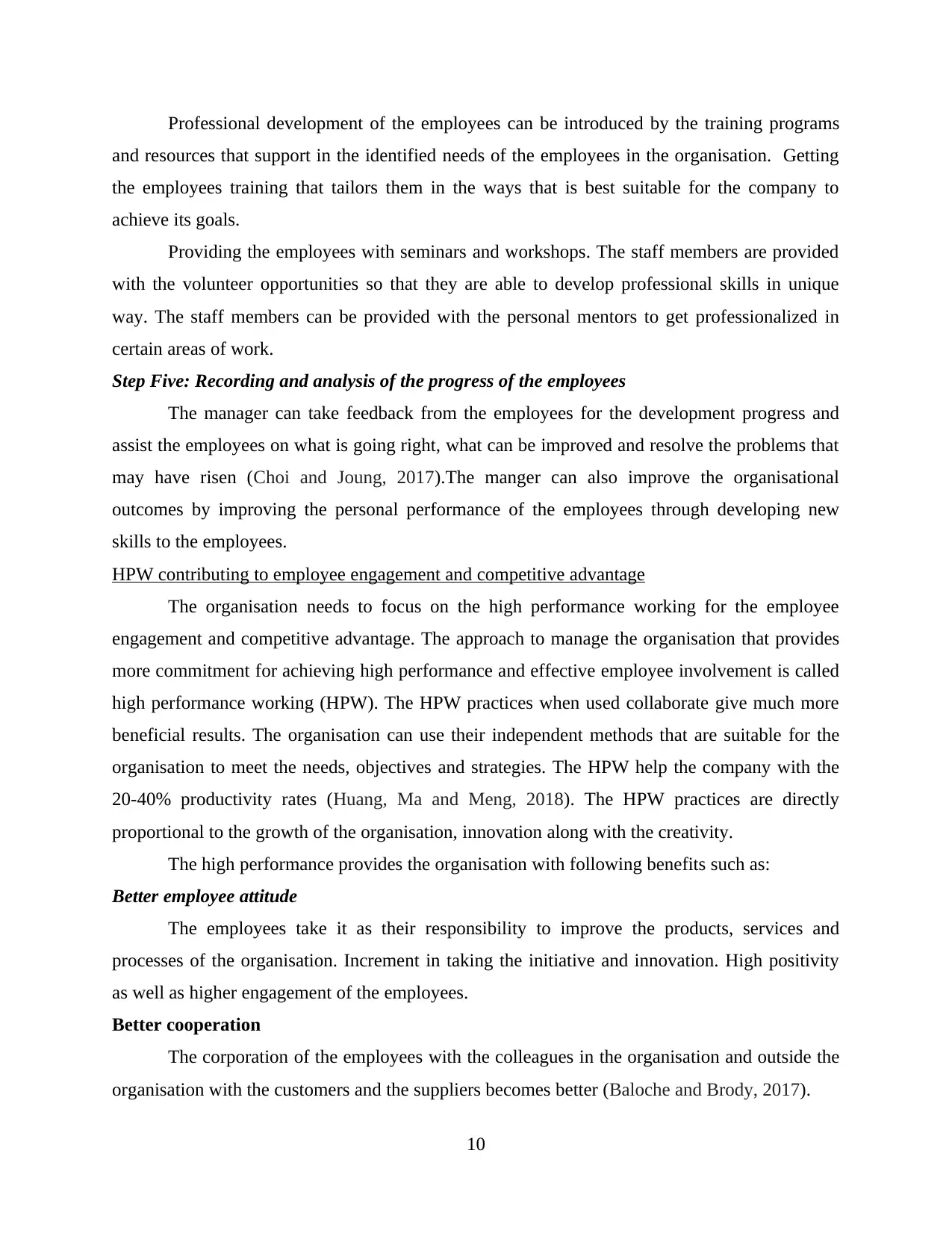
Professional development of the employees can be introduced by the training programs
and resources that support in the identified needs of the employees in the organisation. Getting
the employees training that tailors them in the ways that is best suitable for the company to
achieve its goals.
Providing the employees with seminars and workshops. The staff members are provided
with the volunteer opportunities so that they are able to develop professional skills in unique
way. The staff members can be provided with the personal mentors to get professionalized in
certain areas of work.
Step Five: Recording and analysis of the progress of the employees
The manager can take feedback from the employees for the development progress and
assist the employees on what is going right, what can be improved and resolve the problems that
may have risen (Choi and Joung, 2017).The manger can also improve the organisational
outcomes by improving the personal performance of the employees through developing new
skills to the employees.
HPW contributing to employee engagement and competitive advantage
The organisation needs to focus on the high performance working for the employee
engagement and competitive advantage. The approach to manage the organisation that provides
more commitment for achieving high performance and effective employee involvement is called
high performance working (HPW). The HPW practices when used collaborate give much more
beneficial results. The organisation can use their independent methods that are suitable for the
organisation to meet the needs, objectives and strategies. The HPW help the company with the
20-40% productivity rates (Huang, Ma and Meng, 2018). The HPW practices are directly
proportional to the growth of the organisation, innovation along with the creativity.
The high performance provides the organisation with following benefits such as:
Better employee attitude
The employees take it as their responsibility to improve the products, services and
processes of the organisation. Increment in taking the initiative and innovation. High positivity
as well as higher engagement of the employees.
Better cooperation
The corporation of the employees with the colleagues in the organisation and outside the
organisation with the customers and the suppliers becomes better (Baloche and Brody, 2017).
10
and resources that support in the identified needs of the employees in the organisation. Getting
the employees training that tailors them in the ways that is best suitable for the company to
achieve its goals.
Providing the employees with seminars and workshops. The staff members are provided
with the volunteer opportunities so that they are able to develop professional skills in unique
way. The staff members can be provided with the personal mentors to get professionalized in
certain areas of work.
Step Five: Recording and analysis of the progress of the employees
The manager can take feedback from the employees for the development progress and
assist the employees on what is going right, what can be improved and resolve the problems that
may have risen (Choi and Joung, 2017).The manger can also improve the organisational
outcomes by improving the personal performance of the employees through developing new
skills to the employees.
HPW contributing to employee engagement and competitive advantage
The organisation needs to focus on the high performance working for the employee
engagement and competitive advantage. The approach to manage the organisation that provides
more commitment for achieving high performance and effective employee involvement is called
high performance working (HPW). The HPW practices when used collaborate give much more
beneficial results. The organisation can use their independent methods that are suitable for the
organisation to meet the needs, objectives and strategies. The HPW help the company with the
20-40% productivity rates (Huang, Ma and Meng, 2018). The HPW practices are directly
proportional to the growth of the organisation, innovation along with the creativity.
The high performance provides the organisation with following benefits such as:
Better employee attitude
The employees take it as their responsibility to improve the products, services and
processes of the organisation. Increment in taking the initiative and innovation. High positivity
as well as higher engagement of the employees.
Better cooperation
The corporation of the employees with the colleagues in the organisation and outside the
organisation with the customers and the suppliers becomes better (Baloche and Brody, 2017).
10
⊘ This is a preview!⊘
Do you want full access?
Subscribe today to unlock all pages.

Trusted by 1+ million students worldwide
1 out of 18
Related Documents
Your All-in-One AI-Powered Toolkit for Academic Success.
+13062052269
info@desklib.com
Available 24*7 on WhatsApp / Email
![[object Object]](/_next/static/media/star-bottom.7253800d.svg)
Unlock your academic potential
Copyright © 2020–2026 A2Z Services. All Rights Reserved. Developed and managed by ZUCOL.




